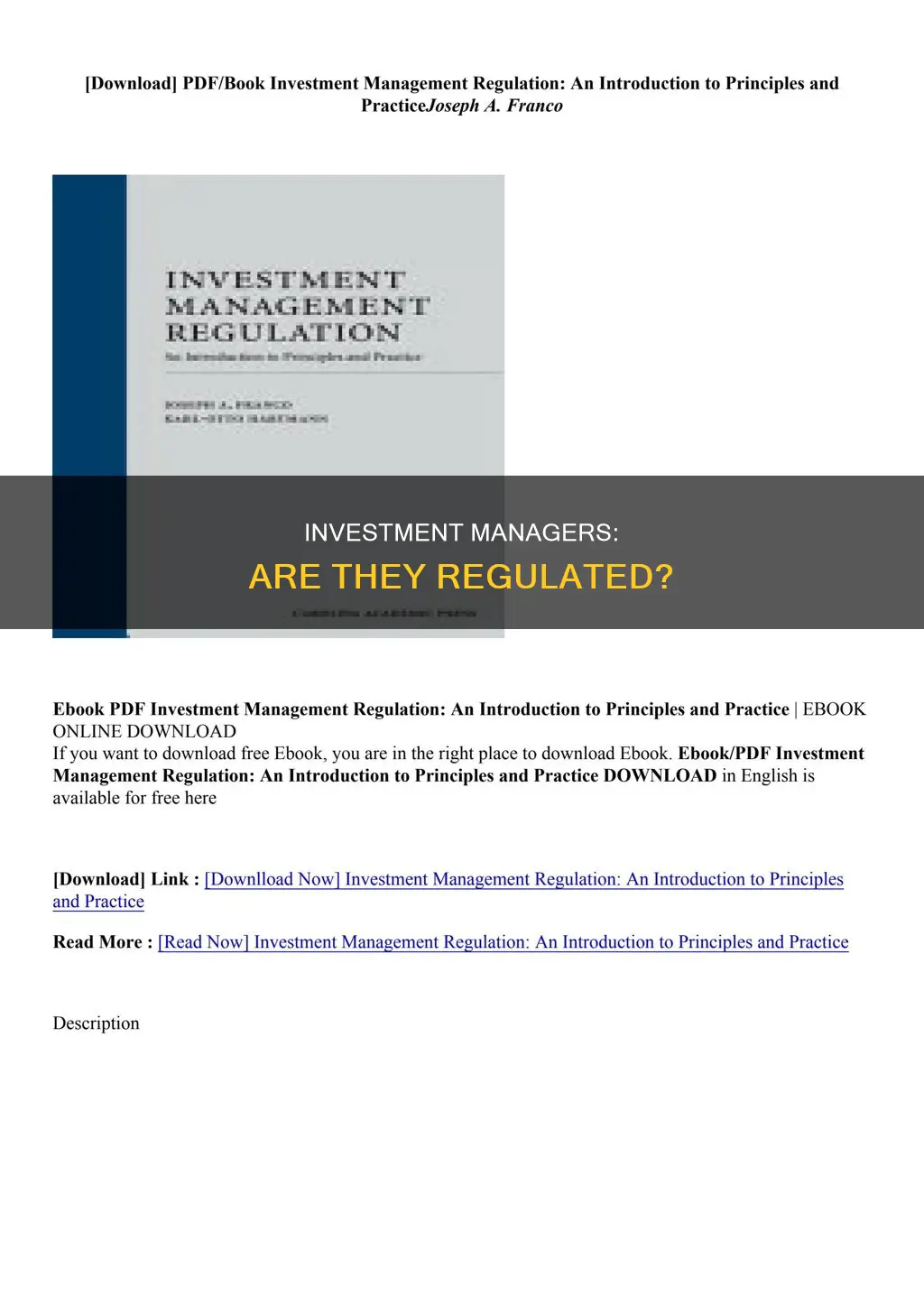
The financial industry is highly regulated, and for good reason. In 2020, total assets under management (AUM) reached $103 trillion, representing an 11% growth from the previous year. Regulation is important as it helps protect the interests of consumers and investors by shielding them from excessive risk and fraud. In the US, investment managers are regulated by the Securities and Exchange Commission (SEC), which was established in 1934 by the Securities Exchange Act. The SEC has broad regulatory powers relating to US securities markets, including the oversight of exchanges and the enforcement of regulations. It also regulates investment advisors with over $110 million in assets under management.
| Characteristics | Values |
|---|---|
| Purpose of regulation | Protect investors, ensure fairness in securities markets, and facilitate capital formation |
| Regulatory bodies | Securities and Exchange Commission (SEC), Financial Industry Regulatory Authority (FINRA), Federal Reserve, U.S. Treasury, Federal Deposit Insurance Corporation (FDIC), Commodity Futures Trading Commission (CFTC), North American Securities Administrators Association (NASAA) |
| Regulatory focus | Licensing, compensation, reporting, filing, accounting, advertising, product offerings, fiduciary responsibilities, enforcement actions |
| Investment types | Mutual funds, stocks, bonds, investment portfolios, investment advice, securities, derivatives, cryptocurrencies |
| Investor protection | Prevent fraud, promote integrity, stability, and transparency, ensure fair treatment of consumers, provide investor education |
What You'll Learn

The Securities and Exchange Commission (SEC)
The SEC regulates investment advisors with over $110 million in assets under management (AUM). Advisors who manage assets below this level are required to register with their states. The SEC asserts that registration does not mean an advisor is endorsed by the agency. Instead, it means that the advisor agrees to adhere to the SEC's rules and is subject to unscheduled audits.
The SEC is responsible for overseeing securities exchanges, securities brokers and dealers, investment advisors, and mutual funds. It promotes fair dealing, the disclosure of important market information, and works to prevent fraud. The SEC also approves registration statements for book-runners among underwriting firms.
The SEC is made up of five divisions and 23 offices. Their goals are to interpret and enforce securities laws, issue new rules, oversee securities institutions, and coordinate regulations among different parts of the government. The five divisions are as follows:
- Division of Corporate Finance: Ensures investors are provided with material information (relevant to a company's financial prospects or price) as they make investment decisions.
- Division of Enforcement: In charge of enforcing SEC regulations by investigating cases and bringing civil suits in federal court and administrative proceedings. It also works with law enforcement agencies and refers cases to the U.S. Department of Justice (DOJ) for criminal prosecution when necessary.
- Division of Investment Management: Regulates investment companies, variable insurance products, and federally registered investment advisors.
- Division of Economic and Risk Analysis: The SEC's economics and data analytics unit.
- Division of Trading and Markets: Establishes and maintains standards for fair, orderly, and efficient markets.
Understanding Passive Portfolio Investment Vehicles: Strategies and Benefits
You may want to see also

Financial Industry Regulatory Authority (FINRA)
The Financial Industry Regulatory Authority (FINRA) is an independent, non-profit regulatory body that operates under the scope of the Securities and Exchange Commission (SEC). FINRA is the largest nongovernmental regulatory agency for securities brokers and dealers in the United States.
FINRA was created in 2007 through the consolidation of the National Association of Securities Dealers (NASD) and the member regulation, enforcement, and arbitration operations of the New York Stock Exchange (NYSE). The organisation's stated mission is "to safeguard the investing public against fraud and bad practices".
FINRA enforces SEC rules and regulations among its members and is responsible for overseeing brokerage firms, individual brokers, and capital acquisition brokers. It also regulates the trading of equities, corporate bonds, securities futures, and options.
FINRA has the power to take disciplinary action against individuals or firms that violate its rules, including issuing fines and expulsions. It also provides resources such as BrokerCheck, a searchable database of brokers, investment advisors, and financial advisors, to help protect investors.
FINRA's main benefit for investors is protection from potential abuses and unethical conduct within the financial industry. The organisation also works to educate investors and take action on their behalf.
Maximizing Your Extra Savings: Smart Investment Strategies
You may want to see also

Investment managers and regulatory pressure from the Financial Stability Oversight Council (FSOC)
The Financial Stability Oversight Council (FSOC) was established in 2010 through the Dodd-Frank Wall Street Reform and Consumer Protection Act. The FSOC is tasked with monitoring and addressing risks to the US financial system, particularly those posed by large, interconnected financial institutions. The FSOC is chaired by the US Secretary of the Treasury and consists of 10 voting members and 5 non-voting members, bringing together federal financial regulators, state regulators, and an independent insurance expert.
The FSOC has three primary purposes:
- Identify risks to the financial stability of the United States from both financial and non-financial organizations.
- Promote market discipline by eliminating the expectation that the government will shield financial institutions from losses in the event of failure.
- Respond to emerging threats to the stability of the US financial system.
The FSOC has the authority to collect information from financial regulatory agencies and direct the Office of Financial Research to gather data from bank holding companies and non-bank financial companies. The FSOC can also set aside certain financial regulations published by the Consumer Financial Protection Bureau if they threaten financial stability.
Investment managers face regulatory pressure from the FSOC, which can designate certain institutions as Systemically Important Financial Institutions (SIFIs). This designation imposes additional regulatory scrutiny from the Federal Reserve Board of Governors (FRB). The FRB's supervisory processes differ from the regulatory framework of the Securities and Exchange Commission (SEC), which typically oversees investment advisors.
To avoid regulatory fines and ensure compliance, investment managers must stay informed about the latest developments in FSOC regulations and adapt their operational and compliance processes accordingly.
Adjusting Your Investment Portfolio: Strategies for Success
You may want to see also

The role of Congress in regulating investment banks
Investment banks in the United States are continuously reviewed and regulated by the Securities and Exchange Commission (SEC). They are also occasionally regulated and investigated by Congress. Investment banks were established as a legal entity separate from commercial banks through the Banking Act of 1933, also known as Glass-Steagall, which was passed by Congress in response to the Great Depression.
Congress has played a key role in regulating investment banks through several influential acts. The Securities Exchange Act of 1934, for instance, introduced new regulations for securities exchanges and broker-dealers, and led to the creation of the SEC. The Investment Company Act and the Investment Advisers Act, both passed in 1940, established regulations for advisers, money managers, and other financial professionals.
Following concerns about the capacity of investment banks to handle large trading volumes after a stock market decline in 1969, Congress established the Securities Investor Protection Corporation (SIPC). In 1975, Congress updated investment bank capital requirements with the Uniform Net Capital Rule (UNCR), mandating that investment banks maintain a certain level of liquid assets and provide detailed quarterly reports.
In 1988, the U.S. Congress attempted to repeal the separation between investment and commercial banks, which was initially put in place to reduce conflicts of interest between banks and customers. They finally succeeded in 1999 with the Financial Services Modernization Act, or Gramm-Leach-Bliley, allowing for the creation of financial holding companies that could own both commercial and investment banks, as well as insurance companies.
After the 2008 financial crisis, Congress passed the Dodd-Frank Wall Street Reform and Consumer Protection Act, introducing a significant number of new regulations for financial institutions.
Debt Investment Portfolio: Understanding Your Debt Investments
You may want to see also

The Sarbanes-Oxley Act (SOX)
SOX was passed by Congress in response to corporate failures and fraud that resulted in substantial financial losses to institutional and individual investors. The act contains provisions affecting corporate governance, risk management, auditing, and financial reporting of public companies, including provisions intended to deter and punish corporate accounting fraud and corruption.
- Registration of accounting firms that audit public companies in US securities markets
- Inspections of registered accounting firms
- Establishment of auditing, quality control, and ethics standards for registered accounting firms
- Investigation and discipline of registered accounting firms for violations of law or professional standards
SOX has been praised for improving investor confidence and increasing the accuracy and reliability of financial statements. It has also been credited with nurturing an ethical culture, as it forces top management to be transparent and protects whistleblowers.
Portfolio Theory: Investment Analysis Fundamentals Explained
You may want to see also
Frequently asked questions
Yes, investment managers are regulated.
Investment managers are regulated by the Securities and Exchange Commission (SEC), which was established in 1934. The SEC has broad regulatory powers relating to US securities markets, including the oversight of exchanges and the enforcement of regulations.
Regulation is important in the financial industry to protect the interests of consumers and investors by shielding them from excessive risk and fraud. Regulation also helps keep capital flowing freely throughout the market and protects the stability of the national economy.
Some of the key regulations that investment managers should be aware of include:
- Securities Act of 1933: This prohibits misrepresentations and fraud in the sale of securities.
- Securities Exchange Act of 1934: This created and empowered the SEC to act as a regulating body with disciplinary powers.
- Investment Company Act of 1940: This regulates companies that invest and trade publicly available securities, including mutual funds.
- Investment Advisers Act of 1940: This put investment advisors under the regulation of the SEC.
- Sarbanes-Oxley Act of 2002: This sought to enforce corporate responsibility and fight corporate fraud, including aspects of financial record-keeping and reporting.
Regulations can significantly impact investment managers' operations and compliance processes. Non-compliance can result in aggressive enforcement actions and hefty fines. Investment managers must stay current with the latest compliance demands and proactively assess their compliance programs to avoid regulatory risks and costs.







